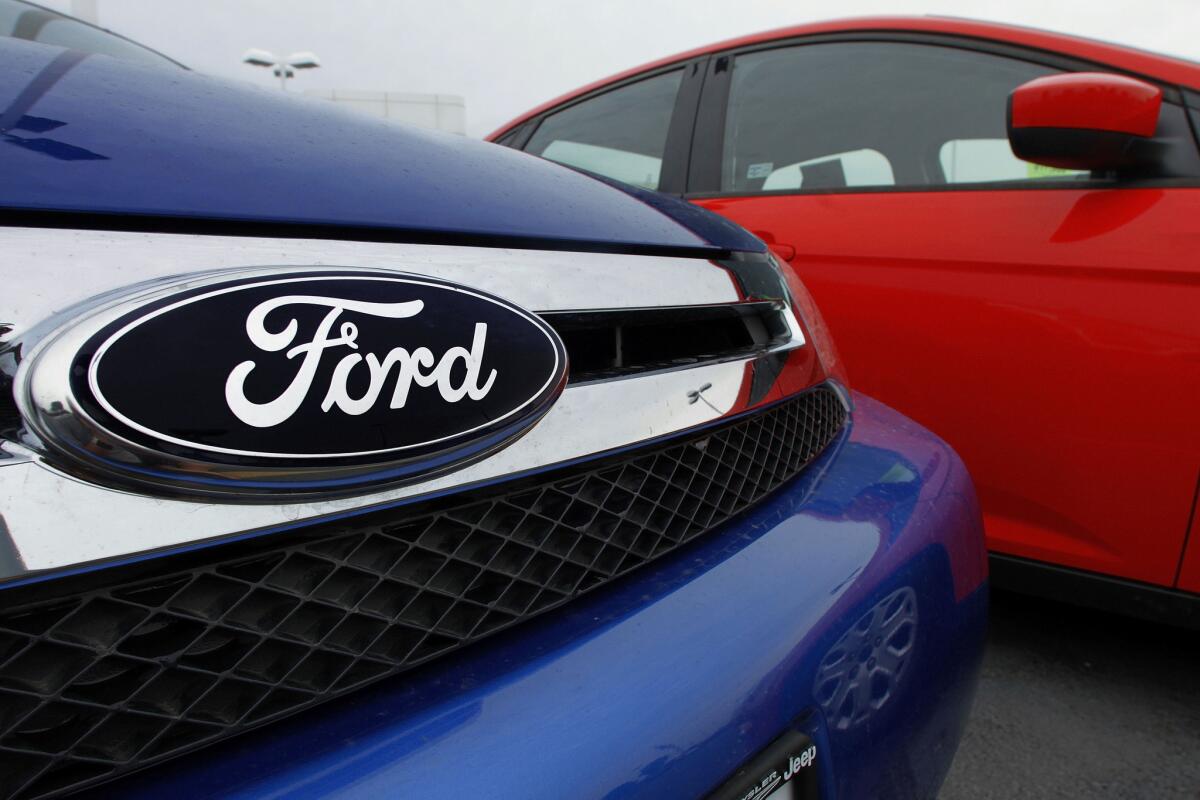Ford battles Uber, Lyft with car-sharing service

Under a new ride-sharing program, customers who finance their vehicles through Ford Motor Credit will be able to rent their vehicle to pre-screened drivers for short-term use, helping to defray monthly vehicle ownership costs.
- Share via
Ford Motor Co. is testing a car-sharing program that helps people rent out autos they purchased from the automaker to prescreened customers as a way to defray the cost of maintaining a vehicle.
The test is acknowledgment by the automaker that the rise of ride-sharing services Uber, Lyft and Zipcar are starting to change how people access automotive transportation, sometimes giving up car ownership.
“Our vision today is to expand that same thinking using advanced technology and new business models, and addressing the mobility challenges people face around the world,” said Ford Executive Chairman Bill Ford, Henry Ford’s great-grandson.
The “Peer-2-Peer Car Sharing” test targets Ford customers in six U.S. cities -- Berkeley, Oakland, San Francisco, Portland, Chicago and Washington, D.C. -- and in London. It runs through November.
Ford Credit is inviting 14,000 customers in the U.S. and 12,000 in London to sign up to rent vehicles to prescreened drivers for short-term use. U.S. customers participate through software provided by ride-share company Getaround. London drivers will connect through easyCar Club. Only people who financed their cars through Ford’s credit arm will be invited.
Getaround will recommend the rental rate based on the make, model and location of the vehicle, but owners can set their own price. Rates are typically $7 to $12 an hour and include customer support and roadside assistance.
Getaround provides the digital platform, collects the funds, takes a 40% cut and then pays the vehicle owner. It also screens the drivers to ensure they have a safe driving record.
“Consumers tell us they are interested in sharing the costs of vehicle ownership, and this program will help us understand how much that extends to customers who are financing a Ford vehicle,” said David McClelland, Ford Credit vice president of marketing.
“As most vehicles are parked and out of use much of the time, this can help us gauge our customers’ desires to pick up extra cash and keep their vehicles in use.”
Ford cited a study from the Penn Schoen Berland research firm that indicates there’s interest in such a service. The firm said that more than half of millennials report being open to sharing rides with others and that they rank car rides second only to book lending as things they are most open to sharing.
Analysts say these attitudes are about to change the way automakers sell cars and customers use them.
“The car, on our estimates, is the world’s most underutilized asset,” Adam Jonas, an analyst at Morgan Stanley Research, said in a recent report to investors.
Although it is just beginning, Uber and other services are causing people to slowly relinquish their ownership and control of the car. The development of autonomous vehicles may pave the way for robotic taxis, and car-sharing services like Uber could become “so cheap that only rich people own cars,” he said.
Ford, for example, is testing a fractional car ownership program in India. Working with car-sharing vendor Zoomcar in Bangalore, Ford has identified several three-person groups with complementary schedules, allowing each pod to share a single vehicle.
“In a lot of areas people might not be able to afford to buy a car or don’t want sole ownership, especially in emerging markets,” said Erica Klampfl, Ford’s global mobility solutions manager.
The biggest impact of these changes in auto ownership will be felt in dense mega-cities.
San Francisco is a prime example of where “we will see business models develop around access to cars but not ownership,” Bob Carter, who heads Toyota’s sales in the U.S., told The Times recently.
Yet in other areas, including sprawling Southern California with its long commutes and decentralized employment, vehicle ownership will continue to drive the auto business, Carter said.
Many in the auto industry are skeptical, arguing that an era of people subscribing to car sharing services – robotic or otherwise – is far in the distant future.
“I believe that the American love affair with cars is alive and well,” said Scott Painter, chief executive of TrueCar, the online digital car pricing service. “I think we can grow the pie. I don’t think we will see a decline” in car sales.
Follow me on Twitter (@LATimesJerry), Facebook and Google+.
ALSO:
Sharing services like Uber, Airbnb sap summer vacation spending, survey says
Ride-hailing firm Uber faces big challenges in China
Sharing economy gets a wake-up call with Uber ruling







